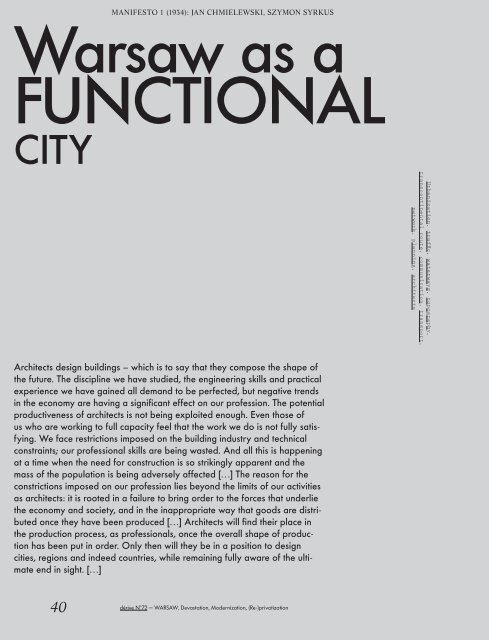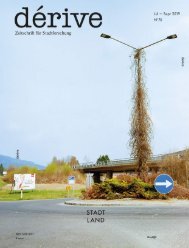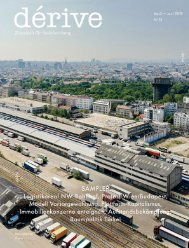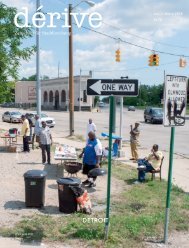Warsaw: Devastation, Modernization, (Re-)privatization, dérive - Zeitschrift für Stadtforschung, Heft 72 (3/2018)
Warsaw is a city that has experienced radical breaks in its development over the last century, which are still relevant and visible in many different ways today. There is the Nazi occupation, the crushing of the Warsaw Ghetto Uprising and the subsequent systematic and almost complete destruction of the city; and more recently, the shift from a state-socialist to capitalist system. The new issue of dérive, entitled »Warsaw: Devastation, Modernization, (Re-)privatization«, sheds light both on these historical components and their impact on contemporary urban society – e.g. on the housing market. In addition, we talk to people who are self-organizing and working on alternative solutions that resist current socio-political conditions. The focal point is entirely in English. You can order it here: https://shop.derive.at/collections/einzelpublikationen/products/heft-72
Warsaw is a city that has experienced radical breaks in its development over the last century, which are still relevant and visible in many different ways today. There is the Nazi occupation, the crushing of the Warsaw Ghetto Uprising and the subsequent systematic and almost complete destruction of the city; and more recently, the shift from a state-socialist to capitalist system. The new issue of dérive, entitled »Warsaw: Devastation, Modernization, (Re-)privatization«, sheds light both on these historical components and their impact on contemporary urban society – e.g. on the housing market. In addition, we talk to people who are self-organizing and working on alternative solutions that resist current socio-political conditions. The focal point is entirely in English. You can order it here: https://shop.derive.at/collections/einzelpublikationen/products/heft-72
You also want an ePaper? Increase the reach of your titles
YUMPU automatically turns print PDFs into web optimized ePapers that Google loves.
MANIFESTO 1 (1934): JAN CHMIELEWSKI, SZYMON SYRKUS<br />
<strong>Warsaw</strong> as a<br />
FUNCTIONAL<br />
CITY<br />
Urbanization, traffic, waterways, topography,<br />
transcontinental route, communication, transport,<br />
network, planning, architects<br />
Architects design buildings – which is to say that they compose the shape of<br />
the future. The discipline we have studied, the engineering skills and practical<br />
experience we have gained all demand to be perfected, but negative trends<br />
in the economy are having a significant effect on our profession. The potential<br />
productiveness of architects is not being exploited enough. Even those of<br />
us who are working to full capacity feel that the work we do is not fully satisfying.<br />
We face restrictions imposed on the building industry and technical<br />
constraints; our professional skills are being wasted. And all this is happening<br />
at a time when the need for construction is so strikingly apparent and the<br />
mass of the population is being adversely affected […] The reason for the<br />
constrictions imposed on our profession lies beyond the limits of our activities<br />
as architects: it is rooted in a failure to bring order to the forces that underlie<br />
the economy and society, and in the inappropriate way that goods are distributed<br />
once they have been produced […] Architects will find their place in<br />
the production process, as professionals, once the overall shape of production<br />
has been put in order. Only then will they be in a position to design<br />
cities, regions and indeed countries, while remaining fully aware of the ultimate<br />
end in sight. […]<br />
40<br />
<strong>dérive</strong> N o <strong>72</strong> — WARSAW. <strong>Devastation</strong>, <strong>Modernization</strong>, (<strong>Re</strong>-)<strong>privatization</strong>
















